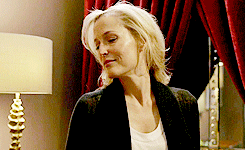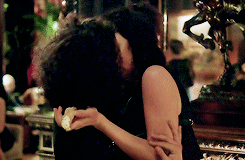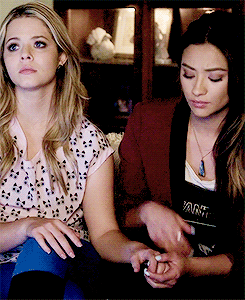How Queer Television Characters Have Been Faring In 2016
By Matilda Douglas-Henry
This post contains spoilers for a lot of shows with queer characters in it. You have been warned!
Yesterday it was announced that the popular comedy series Modern Family had taken a crucial step in queer visibility, with the reveal that the show will feature a trans actor in a guest role. What makes this so ground-breaking is that the character is played by Jackson Millarker, an eight year-old. This is known to be the first time a network series has broadcast an episode with a trans child actor.
What I like most is the context in which Jackson’s character will come into the Modern Family fold. Jackson will be playing Tom, a friend of Lily’s who Cameron and Mitchell organise a playdate with. This is a productive and beneficial way to highlight the prevalence of queer kids; by integrating them into a regular world to prove to all the conservatives out there that we are ~just like them~.
This pretty exciting news got me thinking about the queer television characters we’ve seen so far this year. Which ones have made our hearts hurt with sadness or joy, or left us feeling bitter with disappointment? Which shows sought to interrogate the clichéd LGBTQIA tropes, and which ones purely perpetuated them? I’ve listed my observations below.
There is still a lot of tragedy
I am two episodes into the newest season of Transparent and I feel like my heart is already splitting in half from all the bloody pathos. They also opened the premiere episode with a stunning monologue from My Queen Raquel (thank you for that one, Jill Soloway. You must have read my recent article and done a few last-minute edits).
Unfortunately, heartache on a way grander scale has graced some of my most beloved programs. A lot of our favourite queer characters were killed this year. Quelle surprise! LGBTQIA people never die on our screens – except that they actually always do, with oft-brutal slayings that have the capacity to be a pretty literal interpretation of Lesbian Bed Death (Joss Whedon, I will never forgive you for the death of Tara Maclay).
The two most significant deaths this year occurred very differently. Lexa, from the post-apocalyptic sci-fi series The 100, was killed right after she slept with her love interest, the female protagonist Clarke, for the first time. Orange is the New Black’s Poussey Washington was accidentally crushed by a guard amidst a peaceful protest staged by the inmates at Litchfield.
I am not an avid watcher of The 100, but I have spent enough time watching YouTube compilations of lesbian kissing scenes to know that Clarke and Lexa had incredible chemistry, and ALSO that Clarke is played by Eliza Taylor, who played Janae Timmins on Neighbours, which has blown my mind. Queer fans of The 100 took Lexa’s death very hard, and fairly so. While our onscreen avatars are prone to being killed off, they are especially susceptible to this fate after getting to a point in their narrative arc where they are at peace.
Much like Tara’s devastating death on Buffy – where she was killed by a stray bullet after finally reuniting with Willow – Lexa being killed off right after she had sex with Clarke was yet another nail in the rainbow coffin. Viewers were distraught, and it was enough of a blow to risk forever losing a significant chunk of the fan base.
Poussey’s plight was equally as tragic, yet I oddly support it as a plot development. It was sickeningly awful, but her death served as a powerful commentary on the Black Lives Matter movement, and I think it will give Danielle Brookes (Taystee), who is also a wonderful dramatic actress, really good material to work with in season five. The mourning scene at the end of the season was so beautiful in and of itself that it serves as a sign of even more powerful things to come.
Nevertheless, it’s STILL SO SAD. Just before Poussey died she was beginning to prepare her life after prison. The job with Judy King? The holiday with Soso? Holy Toledo, as my mother would say.
Bisexuals are being portrayed pretty well
Even though we’re fresh off the heels of Bi Visibility Week, it is always so important to acknowledge people who use the bi label as having a valid sexual identity (they are kinda dismissed a lot of the time). 2016 has actually given us some pretty good bisexual storylines; typically with characters who have been around for a while.
It is always so refreshing to see Broad City’s Ilana cruising the streets of NYC, sleeping with whoever takes her fancy. She didn’t get much of a look-in romantically in this year’s third season, but that’s part of her charm – she is a proud bisexual person whose identity is not purely defined by who she is having sex with. Considering her and Lincoln are officially done, though, it’d be great to see her really sinking her teeth into a new love interest. Maybe Alia Shawkat could return as a bonafide 420 blazer so Ilana would be able to accept her.
I know I am probably the only person still watching the totally OTT hyperbole of a series, Pretty Little Liars, but I continue to be obsessed with it and am quietly thrilled that Alison DiLaurentis’s husband turned out to be evil. It seems that she is enticed once again by Emily, her best friend and fleeting high school love interest. Alison’s story arc was becoming pretty conventional. A queer lover to cancel all that out would be divine.
I am also praying that, with the imminent return of BBC’s addictive crime drama The Fall, Detective Stella Gibson (played by Gillian Anderson, hottest person alive) really gays it up. She nearly hooked up with Dr Reed Smith (played by another gay icon Archie Panjabi) in the third episode of season two, and I would like that to actually happen now, please.
I would be remiss were I not to mention two actresses/television queens who came out as bisexual this year too – Aubrey Plaza from Parks and Recreation and Stephanie Beatriz from Brooklyn Nine Nine. Yay!
Few shows are yet to nail it
With the exception of Transparent and Orange is the New Black, there are very few programs that hit the nail on the head when it comes to exploring queerness and its many forms in-depth. We’ve become so accustomed to an unwarranted death of a beloved character, or our life experience being used exclusively as a ratings ploy (hello, Marissa Cooper). Here’s hoping that the rest of the year (and those that follow it) make the right decisions when it comes to queer representation on our screens.







